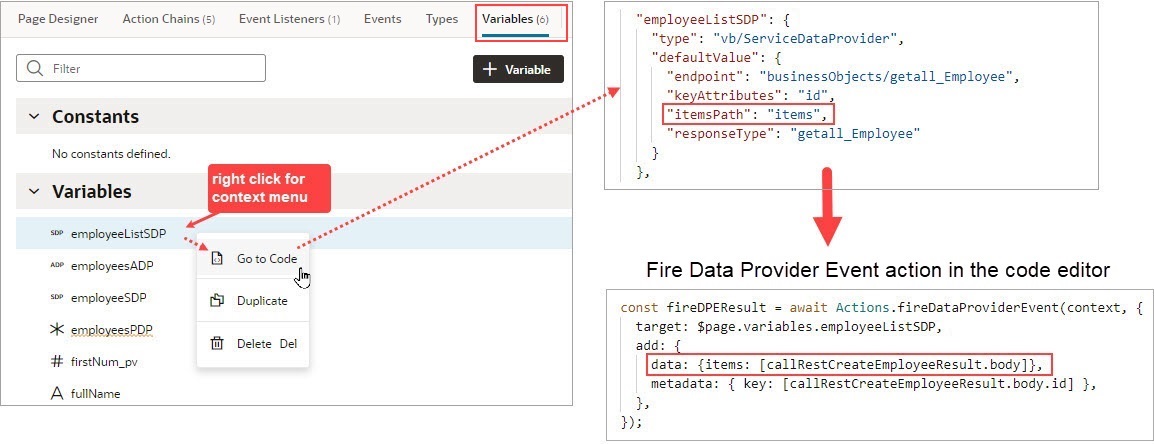Fire Data Provider Event
The Fire Data Provider Event action causes the DataProvider specified via the
target parameter to dispatch an oj.DataProvider event as
a way to notify all listeners registered on that DataProvider to react to changes to the
underlying data. For example, a component using a particular ServiceDataProvider may need to
render new data because new data has been added to the endpoint used by the
ServiceDataProvider.
The action can be called either with a mutation or a refresh event. The refresh event is used to re-fetch and re-render all data, and the mutation event is used to specify which changes to show.
Note:
This action is not necessary for a VB Array Data Provider variable, since the data array of an ADP variable, exposed via thedata property, can be updated directly using the Assign Variable action.
Assigning the data array is automatically detected by VB Studio, and all listeners are notified of this change. Users will be warned
of this when the fireDataProviderEvent is used with an ADP, prior to mutating the
data property directly.
A mutation event can include multiple mutation operations (add, update, remove) as long as the ID values between operations do not intersect. This behavior is enforced by JET components. For example, you cannot add a record and remove it in the same event, because the order of operations cannot be guaranteed.
This table provides details about the parameters for the Fire Data Provider Event action. For further details, see DataProviderOperationEventDetail in Oracle JET API Reference.
| Name | Type | Description |
|---|---|---|
| target | string | Target of the event, usually a variable of type vb/SDP.
Example: target: $variables.employeeSDP |
| refresh | null | Indicates a data provider refresh event needs to be dispatched to
the data provider identified by the target. A null value is specified because the
refresh event does not require a payload.
Example: For further details, see DataProviderRefreshEventDetail in Oracle JET API Reference. |
| add | object | The following properties may be present in the payload:
|
| remove | The payload has one parameter, keys. Use it
to tell VB Studio which records to remove. Although optional, we recommend including
keys - without it, VB Studio won’t know what to remove, and
you'll get an error.
For details about this parameter, see the add event in the preceding row. Example: await Actions.fireDataProviderEvent(context, {
target: $variables.employeeSDP,
remove: {
keys: [$variables.productId],
},
});For more details, see DataProviderMutationEventDetail in Oracle JET API Reference. |
|
| update | The payload is similar to the add event, with one difference:
there's no addBeforeKeys. All parameters are optional, but we
recommend always passing data (which tells VB Studio what changes
to make) and keys (which tells VB Studio which record to update).
If you don’t pass either of these parameters, you’ll get an error.
Example: await Actions.fireDataProviderEvent(context, {
target: $variables.employeeSDP,
update: {
data: {items: [callRestUpdateEmployeeResult.body]},
keys: [callRestCreateEmployeeResult.body.id],
metadata: [{key: callRestCreateEmployeeResult.body.id,}],
},
});For further details, see DataProviderMutationEventDetail in Oracle JET API Reference. |
